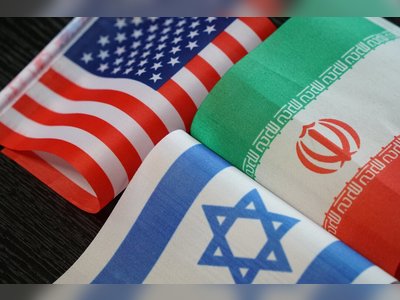
Kingdom of Saudi Arabia Deposits Second Installment of $250 Million in Support to Address Yemeni Government's Budget Deficit
Under the directives of the Custodian of the Two Holy Mosques, King Salman bin Abdulaziz Al Saud, and His Royal Highness the Crown Prince may God protect them and out of the strong brotherly ties and firm bonds between the Kingdom of Saudi Arabia and the Republic of Yemen, the second installment to assist in addressing the Yemeni government's budget deficit has been deposited.
This financial support, which amounts to $250 million US dollars, contributes towards salaries, wages, operational expenses, and food security in Yemen as part of the total aid package of $1.2 billion. It aims to bolster the economic reforms initiated by the Yemeni government.
The Saudi support underscores the Kingdom's dedication to ensuring the security, stability, and prosperity of the Yemeni people and boosting the Yemeni government's budget. It seeks to improve the purchasing power of Yemeni citizens and foster economic recovery in Yemen.
The Kingdom has exerted efforts to fortify the Yemeni economy and enhance the living standards of the Yemeni people. In August 2023, Saudi Arabia announced the provision of $1.2 billion in economic aid to the Republic of Yemen in response to the Yemeni government's request for support in tackling its budget deficit, sustaining salaries, operational expenses, and ensuring food security. This assistance brings Saudi Arabia’s total direct economic and developmental support since 2012 to $11.2 billion as of 2023.
The most notable economic impacts of this support include improving the stability of living conditions for Yemenis, building the capacity of the Yemeni government, implementing a program of economic reforms, and strengthening the Central Bank of Yemen’s monetary policy tools.
Saudi Arabia contributed $1 billion in 2012 and doubled this amount in 2018, with a $2 billion deposit in the Central Bank of Yemen, earmarked for covering the import of essential food commodities. These contributions have positively affected the human development index, fortified foreign currency reserves of the Central Bank, and relatively arrested the currency's collapse, culminating in lower fuel and diesel prices. The nation also witnessed an improvement in living standards and an increase in GDP growth in 2019.
Previous Saudi deposits helped reduce fuel and diesel prices by around 36% in 2019 and the average cost of a minimum food basket by approximately 16% in 2018, maintaining stability through the end of 2019. Additionally, there was a 19% decrease in the prices of imported foodstuffs after peaking in October 2018.
Real GDP growth rates climbed by approximately 0.75% in 2018 and 1.4% in 2019, according to the International Monetary Fund’s 2022 estimates. Furthermore, foreign currency reserves in the Yemeni Central Bank rose from $900 million in 2017 to $2.5 billion in 2018. Food imports increased by around 17% in 2019 compared to the previous year, with exchange rates declining by 25% in 2018.
In 2019, the Central Bank of Yemen succeeded in stabilizing the Yemeni rial exchange rate at 500 rials per US dollar. Saudi Arabia's comprehensive support has partly achieved economic efficiency and bolstered the financial and economic situations in Yemen, notably the exchange rate of the Yemeni rial. This has had a positive impact on Yemeni citizens' livelihoods, promoted price stability of food commodities, curbed the deterioration of purchasing power, decreased inflation rates, and increased spending levels. These factors contributed to improving Yemen's economy in the last quarter of 2018 and through the end of 2019.
Saudi Arabia also played a crucial role in stimulating economic growth in Yemen through grants of oil derivatives allocated for power generation in all Yemeni provinces. These grants, provided by Saudi Arabia, aim to stimulate the Yemeni economy, enhance efficiency in vital, productive, and service sectors, with around 1,260,850 metric tons of oil derivatives worth $422 million supplied in 2021-2022 to operate over 70 Yemeni stations based on identified and studied needs.
The diesel and fuel oil donation amounted to 511,684.41 tons and 257,955.86 tons, respectively. This grant alleviated the Yemeni government's budget burden and preserved the Central Bank's foreign currency reserves intended for purchasing oil derivatives for electricity generation from global markets. It reduced fuel prices for electricity generation by 79% for diesel and 94% for fuel oil.
Saudi Arabia, through its Saudi Program for the Development and Reconstruction of Yemen, has implemented more than 229 developmental projects and initiatives across various Yemeni provinces, serving Yemeni brothers in eight essential and vital sectors: education, health, water, energy, transportation, agriculture, fisheries, government capacity building, and developmental programs.
In addition to the Saudi oil derivatives grant, the Saudi government provided direct support to Yemen as part of a developmental aid package from the Gulf Cooperation Council (GCC) countries to encourage and stimulate economic growth during 2012-2014.
Between 2019 and 2022, Saudi economic and developmental support, alongside a suite of reforms, improved Yemen's financial situation. This assistance such as the Saudi oil derivatives grant helped reduce expenditures and government budget burdens, cutting the deficit ratio from -38% to -23%. It also contributed to supporting and relatively stabilizing the exchange rate of the Yemeni rial against the dollar.
In conclusion, the Kingdom of Saudi Arabia's integrated support has played a pivotal role in revitalizing the Yemeni economy and mitigating burdens on the Yemeni government’s budget, culminating in support that goes beyond financial aid to human and infrastructure development.
The Saudi support underscores the Kingdom's dedication to ensuring the security, stability, and prosperity of the Yemeni people and boosting the Yemeni government's budget. It seeks to improve the purchasing power of Yemeni citizens and foster economic recovery in Yemen.
The Kingdom has exerted efforts to fortify the Yemeni economy and enhance the living standards of the Yemeni people. In August 2023, Saudi Arabia announced the provision of $1.2 billion in economic aid to the Republic of Yemen in response to the Yemeni government's request for support in tackling its budget deficit, sustaining salaries, operational expenses, and ensuring food security. This assistance brings Saudi Arabia’s total direct economic and developmental support since 2012 to $11.2 billion as of 2023.
The most notable economic impacts of this support include improving the stability of living conditions for Yemenis, building the capacity of the Yemeni government, implementing a program of economic reforms, and strengthening the Central Bank of Yemen’s monetary policy tools.
Saudi Arabia contributed $1 billion in 2012 and doubled this amount in 2018, with a $2 billion deposit in the Central Bank of Yemen, earmarked for covering the import of essential food commodities. These contributions have positively affected the human development index, fortified foreign currency reserves of the Central Bank, and relatively arrested the currency's collapse, culminating in lower fuel and diesel prices. The nation also witnessed an improvement in living standards and an increase in GDP growth in 2019.
Previous Saudi deposits helped reduce fuel and diesel prices by around 36% in 2019 and the average cost of a minimum food basket by approximately 16% in 2018, maintaining stability through the end of 2019. Additionally, there was a 19% decrease in the prices of imported foodstuffs after peaking in October 2018.
Real GDP growth rates climbed by approximately 0.75% in 2018 and 1.4% in 2019, according to the International Monetary Fund’s 2022 estimates. Furthermore, foreign currency reserves in the Yemeni Central Bank rose from $900 million in 2017 to $2.5 billion in 2018. Food imports increased by around 17% in 2019 compared to the previous year, with exchange rates declining by 25% in 2018.
In 2019, the Central Bank of Yemen succeeded in stabilizing the Yemeni rial exchange rate at 500 rials per US dollar. Saudi Arabia's comprehensive support has partly achieved economic efficiency and bolstered the financial and economic situations in Yemen, notably the exchange rate of the Yemeni rial. This has had a positive impact on Yemeni citizens' livelihoods, promoted price stability of food commodities, curbed the deterioration of purchasing power, decreased inflation rates, and increased spending levels. These factors contributed to improving Yemen's economy in the last quarter of 2018 and through the end of 2019.
Saudi Arabia also played a crucial role in stimulating economic growth in Yemen through grants of oil derivatives allocated for power generation in all Yemeni provinces. These grants, provided by Saudi Arabia, aim to stimulate the Yemeni economy, enhance efficiency in vital, productive, and service sectors, with around 1,260,850 metric tons of oil derivatives worth $422 million supplied in 2021-2022 to operate over 70 Yemeni stations based on identified and studied needs.
The diesel and fuel oil donation amounted to 511,684.41 tons and 257,955.86 tons, respectively. This grant alleviated the Yemeni government's budget burden and preserved the Central Bank's foreign currency reserves intended for purchasing oil derivatives for electricity generation from global markets. It reduced fuel prices for electricity generation by 79% for diesel and 94% for fuel oil.
Saudi Arabia, through its Saudi Program for the Development and Reconstruction of Yemen, has implemented more than 229 developmental projects and initiatives across various Yemeni provinces, serving Yemeni brothers in eight essential and vital sectors: education, health, water, energy, transportation, agriculture, fisheries, government capacity building, and developmental programs.
In addition to the Saudi oil derivatives grant, the Saudi government provided direct support to Yemen as part of a developmental aid package from the Gulf Cooperation Council (GCC) countries to encourage and stimulate economic growth during 2012-2014.
Between 2019 and 2022, Saudi economic and developmental support, alongside a suite of reforms, improved Yemen's financial situation. This assistance such as the Saudi oil derivatives grant helped reduce expenditures and government budget burdens, cutting the deficit ratio from -38% to -23%. It also contributed to supporting and relatively stabilizing the exchange rate of the Yemeni rial against the dollar.
In conclusion, the Kingdom of Saudi Arabia's integrated support has played a pivotal role in revitalizing the Yemeni economy and mitigating burdens on the Yemeni government’s budget, culminating in support that goes beyond financial aid to human and infrastructure development.











